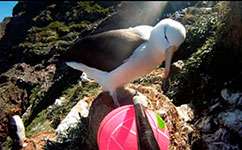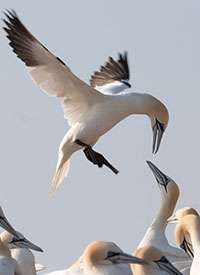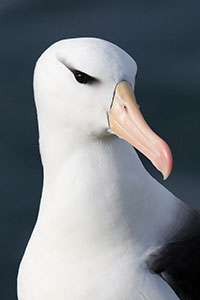Seabirds' personalities determine feeding styles

Seabirds have distinct individual personalities that affect where they feed and how likely they are to prosper, a pair of recent studies suggests.
This could have implications for conservation, because it means threats like being caught on fishing lines and drowned may be more serious for some birds than others, and this could lead to imbalances across whole populations.
The first study, published in Oikos, shows that northern gannets have individual feeding styles that are consistent over time. That is, they repeatedly fly to waters with similar characteristics in search of food, seeming to specialise in hunting in particular ocean environments and probably even in different kinds of prey. This variation may benefit the colony by reducing competition for food.
The researchers looked at gannets at two large colonies, on Grassholm Island off the Welsh coast and at Ile Rouzic off Brittany in France. They analysed a year's worth of data from electronically tracking the birds' movements, alongside information on marine environmental conditions.
This is the first firm evidence of individual seabirds responding in a consistently different way to variations in environmental conditions. The researchers couldn't be sure, though, whether these differences stayed constant over the long term, or what causes them in the first place. Were the birds just responding to changing conditions and competition from other members of their colony, or did their individual feeding preferences arise from their own personalities? And how did these preferences affect their chances of breeding successfully?
Another piece of research, this one in PLOS ONE, tried to address these questions. The study focused on black-browed albatrosses nesting on the Kerguelen Islands in the Indian Ocean. The authors tested each albatross to find out where it fell on the axis between 'bold' or 'shy' - a pair of opposed traits that has been found in many species. Bolder animals tend to be more competitive and willing to take risks, whereas shy ones are more conservative and likely to back down from confrontation.

'We looked at the consequences of being bold or shy on the albatrosses' feeding, which let us find out the costs and benefits of each for their reproductive fitness,' says Dr Samantha Patrick of the University of Gloucestershire and the Centre d'Etudes Biologiques de Chizé, who led both studies.
The scientists tested how bold or shy albatrosses were by putting a large, pink volleyball near their nests and watching how they reacted; the more they showed interest or aggression towards this strange new object, the more their personalities were classified as bold. The authors then looked at how these differences in personality affect how well birds do at finding food and rearing young. Again they used GPS tracking data, as well as demographic information from a long-term monitoring programme.
It turns out that not only do albatrosses have consistent personality traits; these traits also have different effects depending on their sex. In general, being bold is good for females, but not for males.
'Males already tend to be dominant over females, so it could be that aggression is less beneficial to them or there may be costs of being overly aggressive, such as getting into costly confrontations,' says Patrick. 'But for females, being relatively bold is helpful - we think that being more aggressive may help them compete for food.'

It also seems that bolder birds tend to forage closer to the colony, in shallower waters where there's more competition, whereas shy ones are more likely to fly to rich, deep-water feeding grounds further away.
The effects of personality may change from year to year depending on how much food is available to go round, though. In poor years when food is relatively scarce, females that forage further from the colony tend to have more success in breeding, whereas in good years females can do better in shallower waters. So the relationship between boldness and success was stronger in leaner times when even competitive females may fail to outcompete males. Males, on the other hand, always do better when foraging close to the colony.
Albatrosses tend to follow fishing boats and are at serious risk of being caught on lines and drowned, so if boldness determines which birds are in most danger, there may be implications for their conservation.
Patrick says that while bolder individuals might be more likely to compete for discards from boats, if their boldness causes them to stay closer to home, as in this study, they may be less likely to come across the boats at all, and so there may be no clear relationship between personality and fisheries. She says more work is needed to understand how personality mediates these deaths from fishing boats, how this affects whole albatross populations, and how this could be addressed.
More information: Patrick, S.C., Bearhop, S., Gremillet, D., Lescroël, A., Grecian, W.J., Bodey, T.W., Hamer, K.C., Wakefield, E., Le Nuz, M., and Votier, S.C. Individual differences in searching behaviour and spatial foraging consistency in a central place marine predator. Oikos, DOI: 10.1111/j.1600-0706.2013.00406.x
Patrick SC, Weimerskirch H (2014) Personality, Foraging and Fitness Consequences in a Long Lived Seabird. PLoS ONE 9(2): e87269. DOI: 10.1371/journal.pone.0087269
Provided by PlanetEarth Online
This story is republished courtesy of Planet Earth online, a free, companion website to the award-winning magazine Planet Earth published and funded by the Natural Environment Research Council (NERC).





















